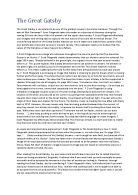Ethier
Jessica Ethier
McCray
English III AP
13 March 2007
Moral Conscience
The nineteen twenties is a decade often referred to as the “Jazz Age” or the “Roaring Twenties”. Nineteen twenties New York, is the setting for The Great Gatsby. Jay Gatsby, a prosperous, intelligent young man who easily falls prey to the extravagant parties, beautiful women, and organized crime of the nineteen twenties. The majority of characters in the novel give in to the same ideas, throwing their inhibitions to the wind, and overlooking morality. Two roles in the novel constantly remind these corrupt people that though they are enjoying their newfound hobbies, someone is constantly watching and judging them. Two roles, Nick Carraway and the eyes of Doctor T.J. Eckleburg represent the moral conscience of the characters of The Great Gatsby.
The eyes of Doctor T.J. Eckleburg symbolize the carelessness of the characters in the novel, an omnipotent God, and the corruption of society. Though the eyes of Doctor T.J. Eckleburg are more a symbol than a character in the novel, they hold equal importance. The eyes of Doctor Eckleburg, a pair of “great unblinking eyes, expressionless, constantly looking down upon the human scene,” are located on a billboard advertisement in the valley of ashes, where the Wilsons live (Perkins 159). Throughout the novel George Wilson works tirelessly to please what he believes to be God. To Wilson, the eyes of Doctor Eckleburg represent his own conscience as well, they constantly remind him that an all-knowing figure constantly watches. Wilson is the only character that perceives the eyes of Doctor Eckleburg as the eyes of God. Other characters do not know what to make of them, though each time they pass the advertisement the eyes often make them feel as though they constantly watched and scrutinized, “Over the ash heaps the giant eyes of Doctor T.J. Eckleburg kept their vigil” (Fitzgerald 124). They are disturbing to the majority of the characters in the novel because they have no fixed meaning, they can be interpreted however one wishes. The eyes constantly remind the characters that though they are enjoying their time however they do so desire, there is constantly someone watching and judging them. Conscience is a sense that “leads to feelings of remorse when we do things that go against our moral values, or which informs our moral judgment before performing such an action” (Webster). The eyes of Dr. T.J. Eckleburg constantly remind the characters that they do have a conscience, as well as a sense of morality.







